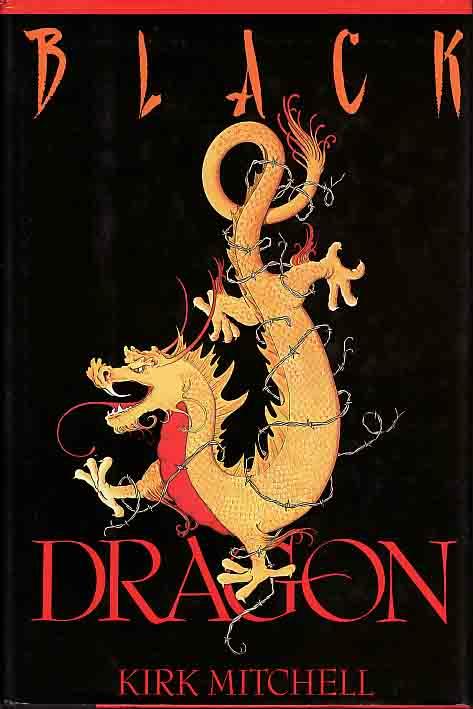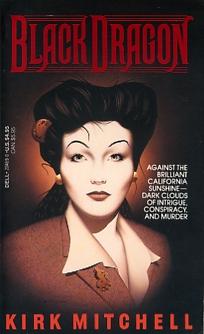
|
|
1988 hardcover edition
|
|

|
|
1989 paperback edition
|
|
Kirk Mitchell
Black Dragon
New York: St. Martin's Press, 1988
410 pages, hardcover
New York: Dell Publishing Group, 1989
407 pages, paperback
Black Dragon is a written-by-the-numbers thriller featuring a tough cop of rural origins who, in the course of seeing a lot in violence and ugliness during World War II, in Europe and in the United States, learns a lot about the world, life, and himself.
The story would have been better with less racial and sexual tension of the sort that has come to define -- and mar -- such fiction. The narrative includes some overly obvious gestures to the ethnic sensitivities that began to emerge on especially California campuses in the late 1960s and early 1970s, and which by the late 1980s had come to affect how many authors wrote mysteries and other genres of popular fiction involving racial and sexual themes.
Hardcover synopsis
The synopsis on the flaps of the jacket of the hardcover edition appears to have been written by someone who was bored with the novel, their job, or both.
|
When World War II erupts, Jared Campbell, son of an Oklahoma sharecropper, finds himself stationed at Manzanar Japanese internment camp in the middle of the California desert, his civilian experience as a homicide detective landing him a military police assignment. But just as Jared has resigned himself to a "boring" war, his camp is rocked by bizarre goings-on: One of the internees, Masao Shido, has committed hara-kiri. No one really doubts the internee ceremoniously took his own life, but what possessed him to do it? Jared enlists the help of Hank Fukuda, the camp's internal chief of police, and the pair uncover an intricate web of politics, deceit, love, and murder.
When the Los Angeles aqueduct is sabotaged with Japanese explosives, top-ranking Army Intelligence officers try to link the internees to the sabotage. Jared and Hank grow suspicious: The Army is too quick to place blame. After all, they are Japanese-Americans, aren't them?
All the clues point to Tadashi Nitta, a wounded war hero and the husband of Jared's internee lover. If Jared gives up his investigation, Tadashi will be found guilty and disgraced -- suitable reason for divorce. Jared would be free to love Kimiko, the beautiful internee, but the Army would use the case as ammunition for their political war against Japanese-Americans. How could Kimiko love such a man? Yet if Tadashi were exonerated, Kimiko would still be married. And what of Hank Fukuda and his determination to discover the truth?
It is an investigation that threatens to destroy them all . . .
|
Though the novel easily meets and may even surpass the standards of the genre, its narrative voice -- like the tone of the jacket synopsis -- shows elements of the sort of exotification of the characters and themes the author contrived to carry the plot. Like a lot of such fiction, it betrays the artificiality of research without familiarity.
Paperback blurbs
The language used to promote Black Dragon was par for the racialist and sexualist standards -- not only of the times in which it is set, but half a century later when it was published, and even twenty years later as I write this.
|
They were behind the lines . . . but the weren't out of the war.
Once a California orchard, Manzanar was now a little piece of hell for hundreds of imprisoned Americans. Their only crime: to be born Japanese.
Military Police Lieutenant Jared Campbell knew the truth, especially since he'd fallen in love with the delicately beautiful -- and forbidden -- Kimiko. But as a former cop, he also knew that the body on the bloody rice mat wasn't a case of hara-kiri. Masao Shido, member of the outlawed Black Dragon Society, had been brutally murdered. Soon the killer's trail would lead from the camp's ramshackle huts to the inner circle of the military intelligence elite. And suddenly Jared would become a man who knew too much, trapped in a tangled web of deceit, desire, and espionage where his only options were to flight, to run . . . or to die.
|
How is it that Manzanar is a "Japanese internment camp"? It is, after all, "in the middle of the California desert" -- which, as I recall, has been under the jurisdiction of the United States since roughly the middle of the 18th century.
How is it that "Americans" can be born "Japanese"? Are none of the characters "Japanese" rather than "Americans"? Are some of the characters actually both "Americans" and "Japanese"? How does the occasional use of a hyphen clarify any of this?
Does the term "hara-kiri" (never mind its italics and hyphen) reflect the attitude of Lt. Campbell? Or the narrator? Or the publishers? Or the majority of the expected readers? Why does harakiri always have to be "ceremonious"?
The "internee lover" has to be a "beautiful internee" who is "delicately beautiful" -- and her name has to end in "-ko" -- and the romance has to be "forbidden".
Cast of character (paperback edition)
The characters are cut from cardboard manufactured after real and fictional "relocation camp" stories had become fairly common, and central casting was bound by newer rules of representation.
|
A Deadly Web of Wartime Intrigue
LT. JARED CAMPBELL
-- A raw-boned, steel-fisted Okie, he volunteered to fight the Nazis. But his experience as a former homicide cop earned him an assignment to the military police at Manzanar. Now he'd stumbled on a savage murder . . . and a wartime secret that could get him killed.
HANK FUKUDA
-- Once a crack forensic investigator, his family had been U.S. citizens for decades longer than many of his brutal captors. Now he's chief of the camp's internal police . . . and maybe someone's spy.
MASAO SHIDO
-- One-time head of the ultra-secret Black Dragon Society, which was believed to support the emperor with covert terrorism. How his death threatens to ignite the camp's explosive tensions.
MONTGOMERY LEE, U.S.N.
-- He resigned his commission after losing his ship to the Japanese in the waters of the Yangtze. Now he commands a campful of people whose cousins cost him his manhood.
TADASHI NITTA
-- He lost his arm fighting the Nazis. He returned to find his family in an internment camp and his wife in love with another man.
KIMIKO
-- Jared's forbidden lover. He must betray her if he intends to save her. Has she already been targeted as the next to die?
|
"California has a statute"
In the end, Jared sails off to an uncertain fate without Kimiko. Understanding the implications of last scene will require a little familiarity with the final half-year of the Pacific War. Making sense of the scene immediately before the ending will require a greater understanding than the author appears to have had of California law.
Kimiko refuses Jared's proposal for marriage on the eve of his departure from San Francisco on the cruiser Nebraska, bound for the Pacific theater, where he will join up with an infantry division. One reason she gives for turning him down is this (paperback, page 401).
|
"And my God, Jared -- California has a statute that would nullify our marriage even if we went to a justice of the peace in another state. Don't you see? Whichever way we turn -- don't you see?"
|
I get the impression that Mitchell, throwing his voice as the narrator, expects the reader to believe that Kimiko and Jared are knowledgeable about such things, and that she is correct. Otherwise Jared, who is no dummy, would have objected. No? But there are grounds for objection.
Perez v. Sharp, 1948 (California)
Section 60 of California's Civil Code at the time provided that "All marriages of white persons with Negroes, Mongolians, members of the Malay race, or mulattoes are illegal and void." Section 69, which implemented this provision, stated that ". . . no license may be issued authorizing the marriage of a white person with a Negro, mulatto, Mongolian or member of the Malay race."
On 1 October 1948, California's Supreme Court struck down these articles as unconstitional in a case known as Perez v. Sharp (32 Cal. 2d 711, 1948).
Naim v. Naim, 1955 (Virginia)
Referring to a 1955 Virgina Supreme Court decision Naim v. Naim (197 Va. 80; 87 SE2d 749, 1955), which upheld the state's antimiscegenation laws, Randall Kennedy makes the following remark about an opinion written by Justice Archibald Chapman Buchanan (Interracial Intimacies (Sex, Marriage, identity, and Adoption), New York: Pantheon Books, 2003, page 269, underscoring mine).
|
Buchanan was at pains to distinguish Virginia's antimiscegenation from the one struck down by the California Supreme Court in Perez. Echoing a point made by several law-review commentators, the justice suggested that loopholes in California's antimiscegenation law had called into question its legitimacy. For one thing, that statute (unlike all similar laws in other states) provided no criminal penalties for its violation. Moreover, California recognized interracial marriages contracted elsewhere, even in those cases in which the parties left the state expressly for the purpose of getting married in a jurisdiction where such unions were permitted, all the while intending to return to California. For some observers, there mere existence of these loopholes precluded the state from plausibly claiming that preventing interracial marriage and the proliferation of mixed-race children was an item of major importance on its agenda. Justice Buchanan stressed that the situation was very different in Virginia, where the commonwealth did employ criminal penalties to enforce its prohibition against interracial marriage and specifically forbade parties from knowingly circumventing its antimiscegenation law.
|
Robert Davis, in In Kimura (1989), published a year after Black Dragon, featured a victim named Janice Simms, who was "a Japanese-American, but she was married to a Caucasian, and therefore was exempted from the relocation" (Davis 1989, page 51).
|

